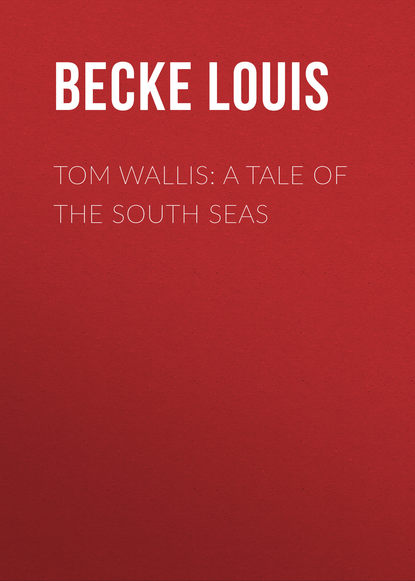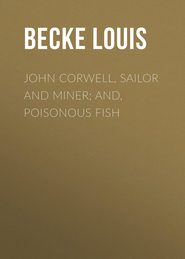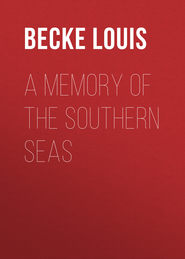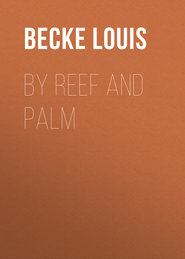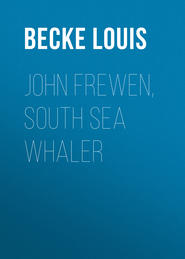По всем вопросам обращайтесь на: info@litportal.ru
(©) 2003-2024.
✖
Tom Wallis: A Tale of the South Seas
Настройки чтения
Размер шрифта
Высота строк
Поля
Hayes was in such an excellent humour that the work proceeded very pleasantly, and he talked with almost boyish exuberancy to Tom about the island of Fotuna and the natives. They were, he said, rather a saucy lot, and as he did not want to have his decks filled with three or four hundred of them, and run the risk of a fight occurring between them and his cargo of 'blackbirds,' he would do all the trading on shore, weigh the yams on the beach, and send them off in the boats to the ship.
'They are not a bad lot of people,' he added, 'although they are all good Catholics-that is, every man, woman, and child of them have crucifixes hanging round their necks-and all are born thieves. However, they know their mark, and won't try to rob me.'
Soon after dinner the Leonie sailed into a tiny little harbour under the shadow of Mount Schouten, and anchored within a few yards of the beach, and directly in front of the largest village on the island. Taking Tom with him, the captain at once went on shore, and interviewed the leading chief and the one white trader-an old white-headed Englishman, whom Tom learnt afterwards was an escaped convict. A bargain was soon made, as yams were very plentiful, no trading ship had touched at the island for many months, and the natives were eager to sell. The chief showed Hayes some specimens of the yam crop-three enormous vegetables, each of which weighed sixty or seventy pounds. Then a conch-shell was sounded, and the chief and his head men summoned the people together, and ordered them to begin digging the yams at once.
Promising to bring the trade ashore at daylight, and begin weighing the yams, Hayes, accompanied by the chief and the old trader-who seemed a respectable, quiet-mannered man-returned to the ship, leaving Tom to enjoy a few hours' pigeon-shooting along the sides of the forest-clad mountain.
The birds were uttering their deep crooing notes everywhere around him, as they fed upon the scarlet berries of the lofty maso'i trees, and the native lad who came with Tom as guide soon had eight or nine brace of the fat, heavy birds to carry. Returning by the banks of a noisy mountain stream, Tom threw himself down beside a deep crystal pool to rest, whilst the lithe, bronze-skinned native, whose only garment was a girdle of grass, ascended a coco-nut tree for some young drinking nuts. The largest of these he quickly husked with his sharp white teeth, and handed it to Tom to drink. As he drank he heard a footstep near, and looking up he saw standing beside him a man dressed in the habit of a priest. He saluted Tom politely, told him that he was Père Serge, one of the two priests living on the island, made a few inquiries about the Leonie, frowned expressively when he heard the name of Captain Hayes, but then said, cordially enough, that he would be pleased if Tom would visit him.
'Thank you,' said Tom, 'I shall be very pleased to come to-morrow, if the captain does not want me on board.'
'But you surely are not a sailor, and an officer; no, you cannot be, you are too young?' inquired the priest in his clear English.
'I am a passenger, sir.'
The père held up his hands. 'A passenger with such a captain, and on such a ship! Ah! my poor sir, you have fallen into bad hands, I fear;' and then noticing the sudden flush on Tom's cheeks, he added hurriedly, 'But never mind Captain Hayes. I shall be glad if you will come to me. And at my mission, two miles from here, there are many more pigeons than there are at Singavi, and the waters of this little river here are full of very nice fish. You shall fish and shoot, and tell me of your travels;' and he smiled as he held out his hand. 'You will not forget to come?'
As soon as Tom returned on board he found the captain, the old trader, and Mr. Kelly all seated together on the quarter deck, drinking, smoking, and chatting. He was pleased to see that nearly every one of the 'blackbirds' were also on deck, devouring with great gusto baked pork, fish, taro, and yams, which Hayes had bought for them from the Singavi natives. Great piles of young coco-nuts were everywhere lying about the deck, mingled with bunches of bananas, pineapples, and baskets of sun-dried oranges-the latter being left untouched, as the 'blackbirds,' never having seen an orange before, would not eat them. They were all talking, and shouting, and eating at such a rate that Tom was astonished; and his astonishment was increased when he noticed that none of the brig's crew were armed, and that the usual guard were up for'ard, smoking and playing cards.
As he was washing his hands in the cabin, Mr. Harvey, a young, hard-faced, silent man of about thirty, with whom Tom seldom exchanged a word, came below and sat down and began filling his pipe.
'What do you think of the happy-family party on deck, Mr. Wallis? I mean the woolly-haired, black-toothed crowd.'
'Don't they seem jolly, Mr. Harvey? And they have the run of the deck, too.'
Harvey laughed in his quiet way. 'They're all right. Did you notice those two big iron pots with fires lit under them, on shore, just outside the trader's house?'
'Yes, I did. Whaler's try-pots, aren't they? What is boiling in them?'
Harvey nodded. 'Only water. They belonged to the Comboy, a New Bedford whaleship, which went ashore here a good many years ago-before you were born. Well, about an hour ago the skipper called our "blackbirds" together, and solemnly told them that the pots are used by the Fotuna natives to cook strangers in, and that fires had been lighted under them in the hope that Hayes would sell a few of his passengers every day to make a feast. It just scared the life out of them, especially as an old French priest happened to pass along the beach at that time, followed by a lot of converts dressed in white sulus; Hayes pointed him out to them, and said he was the principal "devil doctor" who, with his gang of meat carvers, had come down to the beach to see if there was any meat ready.'
Tom laughed. 'It's funny; but do the "blackbirds" believe it?'
'Rather. And as long as we are at this island we shall have no trouble with our cargo of niggers. They think that they would be killed, cut up, put into those pots, and eaten by the Fotuna natives in a brace of shakes, if Hayes gets mad with them. Oh, it's a mighty smart trick, and saves the hands a lot of trouble.'
'But don't you think, Mr. Harvey, that it is rather a mean sort of trick? The Catholic priests here have done a lot of good to the natives, and redeemed them from their savage customs, have they not? Mr. Collier said that of them.'
Harvey laughed scornfully. 'I'm a "holy Roman," lad-born and bred-but I've sailed the South Seas for twenty years, and I know as much about missionaries as any man, and I tell you this-these French priests here have done a lot of good, in many ways; and yet these Fotuna natives are taught to believe that all white men who are not Roman Catholics will be damned.'
'Are you sure, Mr. Harvey?'
'Sure!'-and the stern-faced young officer dashed his clenched hand down upon the cabin table-'sure! My boy, you will learn a lot before you get back to your home again in Australia. Wait till we get to Samoa, and there you will see what the Protestant missionaries have done, and what the French priests have done, and you can size up the work of both alongside, and draw your own conclusions. I am, as I said just now, a Roman Catholic, but I know a lot about the way in which the French priests "Christianize" the natives of these islands, and I despise many of their ways. They have come to the South Seas under the protection of the British flag, in British ships, following in the wake of English missionaries who have done all the hard graft, and then they teach their converts to hate and despise everything that is English and Protestant-from the pennant of an admiral to the jibsheet-block of a British trading schooner.'
'Poor Mr. Collier told me that the French missionaries, although they cause a great deal of trouble, are very good men, Mr. Harvey.'
'Good men! Ay. Guess they're good enough in some ways. They build their own churches and live like the Kanakas themselves, and I allow they don't go in for making dollars. But they poison the native mind against everything that is British or American. Why, three years ago, when I was in Wallis Island, I went ashore to church, and the priest there gave me a bundle of school primers printed in Samoan, and asked me to spread 'em around amongst the natives in the Tokelau Group, on account of the pictures.'
'Pictures?'
'Ay, pictures-pictures that would just grip the fancy of nine out of every ten Kanakas; pictures showing how the cruel and wicked lotu Peretania(Protestant faith) was sending people to hell; pictures showing an English missionary chasing a native woman-with thundering lies printed at the foot; pictures showing Jesus Christ and the Virgin Mary dressed in store clothes.'[2 - Note by the author. – This school primer of which Harvey speaks was actually circulated in the South Seas by the Roman Catholic missionaries. It was printed in Marseilles, but other editions were issued from Sydney in 1866 or 1867.]
'Oh, stop, Mr. Harvey, stop! Don't speak like that! Don't laugh so mockingly when you name our Saviour!'
'Mockingly, Tom? No! I'm a rough sailor, and a fit man to be an officer for such a hell afloat as the brig Leonie. I'm as bad as any man can be morally, but I am no mocker of sacred things.'
'I did not mean to hurt or offend you, Mr. Harvey. And I know that you are neither a brute nor a bully.'
The second mate placed his hand on Tom's shoulder.
'I'm glad to hear you say that, Tom, and I wish it was true. But I was brought up in a rough school-in the fo'c'sle of a New Bedford whaler-and I guess I've been getting more and more of a brute and a basher every day of my life. My father was an Irishman and a Roman Catholic, but didn't care a cuss for the priest; my mother was not only an Irishwoman and a holy Roman, but a bigoted one as well, and taught me from the very first to hate and despise the Protestants; and I hated and despised them profusely until I went to sea in the whaler, and found out that a Protestant was just as good a sailor-man as any holy Roman. But I was going to tell you about those pictures.'
He laughed again, and his usually gloomy face was so lit up, that Tom could not help smiling in anticipation.
'These good, gentle priests,' continued Harvey, 'hate Englishmen and Americans like poison; they cause more bloodshed and misery by their lies- There, that's all. I'm off on deck for a smoke before supper.'
Just after supper was over Maori Bill suggested to Tom that they should ask the captain to let them have one of the whaleboats, and go fishing out in the deep water of the harbour. Tom at once went to Hayes, who was pacing the main deck, talking to the old trader.
'Certainly,' he answered. 'I'd come with you myself, but Ned and I are talking about business. Take a couple of hands with you, and bring back a load of fish. You'll get some hundred-pounder groper, and red rock-cod here. Oh, Bill is going with you, is he? Tell him I want to see him for a minute or two first.'
In a few minutes Tom had his fishing-gear ready; the boat with two hands was brought alongside, and Maori Bill, carrying a basket of young coco-nuts in his hand, came up to the captain.
'Mr. Wallis told me you wanted to speak to me, sir.'
'Yes, Bill, I do. It is only'-and here Hayes spoke in his sauvest tones-'it is only to say that you have done your duty as second mate to my satisfaction. But as Mr. Kelly is now well again, and I have no need for you on board, I am going to leave you here as a trader in place of old Ned, who wants to make a trip to Samoa.'
The big half-caste placed his basket on the deck, and looked at Hayes steadily.
'I don't want a trader's berth, Captain Hayes. I came aboard here to look after young Mr. Wallis, and do second mate's duty, until Mr. Kelly was better. That was the agreement you made with Captain Hawkins.'
Hayes's face flushed deeply. 'Man! do you know who you are talking to?'
'Yes, sir, to you. And I'm willing to go for'ard and do my duty as a seaman if you ask me, but I'm not going to take a trader's berth ashore to please you or anybody else. My father was a white man-as good as you. I mean no disrespect to you, sir. But I'm not a Chileno or a Dutchman, and won't be hazed by any man on God's earth!'
For a moment or so Hayes regarded the half-caste steadily, then he said quietly-
'You're a bit of a fighting man, aren't you?'
'Yes, sir. But that has nothing to do with my going ashore here.'
'Put up your hands, you half-bred nigger!' and Hayes strode up to Maori Bill with blazing eyes. 'I'll pound the life out of you in two minutes!'
'No, you won't, captain!' and Kelly, the chief mate, sprang in front of him, and put the muzzle of a Colt's revolver against Maori Bill's chest. 'We can't afford to hev no trouble.'
In an instant the Maori seized the weapon by the barrel, wrenched it from Kelly's hand, and threw it overboard, then lifting the mate up in his arms, he dashed him down upon the deck, where he lay stunned.
The second mate and carpenter both made a rush at the half-caste, but Hayes was before them.
'Keep back, Harvey! keep back, carpenter! Let me deal with him. Now, Mr. Maori Bill, I'll teach you a lesson that will last you for a month of Sundays!' and launching out his left hand with lightning-like rapidity, he seized the Maori by the throat, and in a moment the two men were struggling madly on the deck.





